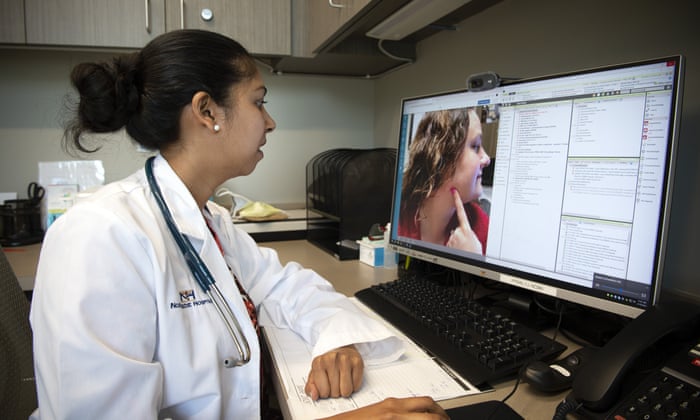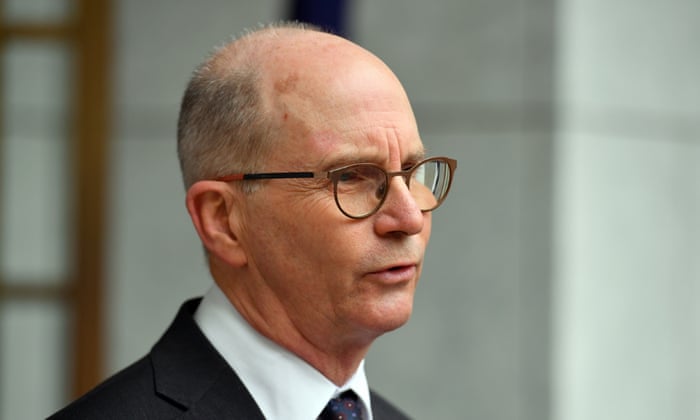
Covid reinfection period reduced to four weeks in NSW as new Omicron subvariant able to reinfect after 28 days
NSW Health today announced that – effective immediately – the Covid reinfection period is now four weeks, down from 12.
It follows similar moves by the WA and ACT governments yesterday, in line with advice from the Australian Health Protection Principal Committee.
Anyone in the state experiencing Covid symptoms from 28 days after their isolation ends is now required to test for the virus.
In a statement, the chief health officer, Kerry Chant, said the new advice was due to the Omicron BA.4 and BA.5 subvariants “circulating widely in NSW”:
They are more able to evade immunity gained from previous infection and vaccination reinfection is more likely and possible just weeks after a prior infection.
Key events:
Wong has emphasised the importance the forum remain united, in light of the withdrawal of Kiribati from the forum.
I had a very good discussion today with the secretary of FSM and we spoke about the lived experience of the Micronesian states to climate change. And, as you know, that was one of the key aspects of Prime Minister Albanese’s election campaign.
I’d like to make a comment about the unity of the forum, which has obviously been a big discussion over these last week. The region is stronger together. It’s a simple proposition. The region is stronger together.
And in the bilateral they have had, in the discussions I have had in my previous visits in the dialogue today, leaders talked about the challenges the region faces, climate change, Covid, and recovery from Covid, both of which have fallen harder on this region and on many other parts of the world and, of course, strategic competition. And all the nations of this region are seeking to navigate those challenges. …and we do it best when we do it together. That is the approach Australia has taken. That is the approach the Pacific Islands Forum has taken and that is why Pacific for immunity is so important. As you know,
There have been a lot of discussions about Pacific Islands Forum unity and the position the Australian government has consistently taken is we were seeking to support whatever the consensus could deliver, because the most important thing was to ensure that at this time, in a contestable, in a world confronting climate, COVID, and economic recovery from COVID, that the forum remain united.
Penny Wong, the minister for foreign affairs, is giving a press conference from Suva where she is attending the Pacific Islands Forum.
I said today at the leaders forum dialogue that we are here to listen and learn. It is obviously my first forum and it was a very important to listen to the contributions from the various perspectives of presidents and prime ministers around the table and they gained a lot from that.
As they have said previously, the Australian government, the new Australian government is committed to bringing new energy and new resources to the Pacific and we recognise, in particular, the importance of climate change.

Rafqa Touma
China’s monopoly on solar under spotlight at forum
Reporter Rafqa Touma here with some updates from today’s Sydney Energy Forum, where leaders in government and industry from around the world are gathering to discuss clean energy supply, sustainability and security in the Indo-Pacific region.
Dr Fatih Birol, Executive Director of International Energy Agency, urges that leaders “need to think about” China’s monopoly on solar energy manufacturing “from an energy security perspective” at the Sydney Energy Forum today:
Of all the manufacturing capacity around the world … about 80% of the global supply chain manufacturing comes from one single country – China.
China did excellently within the last 15 years to bring the cost of solar down, providing multiple benefits around the world. But at the same time, today, 80% … is a big number.
Every country “relying on technology from one single country … is something we all need to think about from an energy security perspective”.
Victoria reduces Covid reinfection period to four weeks

Adeshola Ore
Victoria has joined NSW in reducing the state’s Covid reinfection period to four weeks, as the state government recommends people wear masks indoors and in crowded public places.
It follows similar moves by the WA and ACT governments yesterday in line with advice from the the Australian Health Protection Principal Committee. The previous Covid reinfection period – when people are exempt from testing and isolating – was 12 weeks.
The Victorian government has also requested employers consider working-from-home arrangements, noting there has been a 53% increase in the number of Victorians in hospital with Covid over the past two weeks.

All smiles in Suva
Guardian Australia’s Pacific editor, Kate Lyons, is currently in Suva covering the Pacific Islands Forum.
This morning, she was there for a warm greeting between Jacinda Ardern, the prime minster of New Zealand, and Penny Wong, Australia’s minister for foreign affairs.
Flood toll on NSW roads emerges
NSW roads are significantly damaged by last week’s floods, as this image from Wiseman’s Ferry shows.
The state’s Rural Fire Service has reminded Australians the unknown condition of the roads is another reason why it’s unsafe to cross flood waters.
A great example of why you should never drive through flood waters, as it’s not possible to tell the condition of the road until the flood waters recede. This road in Wiseman’s Ferry will be closed for some time as significant repairs are required before it can be reopened. pic.twitter.com/zRw3aoxyG1
— NSW RFS (@NSWRFS) July 11, 2022

Paul Karp
‘I am very uncomfortable with this voice’: Abbott on Indigenous voice to parliament
The former Liberal prime minister, Tony Abbott, also shared his views on the Indigenous voice to parliament, which Labor wants to hold a referendum on as soon as 2023.
Abbott told Radio National:
Let me say I think the opposition is right in the first instance to demand all the detail from the government. Personally, I am very uncomfortable with this voice, with what Malcolm Turnbull called a third chamber of parliament. I’m uncomfortable electing a body determined by race.
When Abbott was pulled up on the fact the voice is not a third chamber of parliament he said he was merely “citing what my successor said” – which isn’t a great way to engage in public discourse, happily repeating a misrepresentation as long as someone else said it first.
Abbott continued:
You can’t ask the people for a blank cheque on something as significant as this. If asked to vote on an unspecified voice, the natural response will be to say, ‘If you don’t know, vote no.’ The last thing we want is a referendum designed to forward reconciliation defeated and inevitably that puts reconciliation back.
The most likely referendum proposal is to include an enabling provision in the constitution, specifying that parliament will legislate the design of the voice. Not necessarily a blank cheque, depending on how much detail is released about the design of the body to be legislated.
Victoria records 16 Covid deaths and 737 people in hospital
There were 10,627 new cases in the last reporting period, and 39 people are in intensive care.
‘Finding common ground’: Albanese on nations working together
Prime Minister Anthony Albanese has begun his opening address at the Sydney Energy Forum, emphasising the need for nations to work together towards a common good:
The COVID-19 pandemic has exposed vulnerabilities and laid bare challenges that we simply cannot ignore. There are many lessons that we will all take from this experience, but one of the most critical ones for me is that we are stronger when we work together.
We are, for all of our differences, one common human family and we all call this one fragile planet our home. When we pause and reflect on this, we recognise our connection to one another. We recognise that we have a common stake in each other and that the best way to meet the challenges in front of us is by finding common ground. That is what this forum is about – finding common ground. And that’s the message I’m carrying with me today, a message underscored by your presence here today.
The diversity and unity of purpose in this room makes it very clear – all of you coming together from across sectors and nations because you understand that our future is linked. All of us here know what needs to be done. The nature of the challenge and the science is not in question. Its urgency and scope is clear. The question is our ability, but importantly as well our appetite to seize the opportunities that it contains and to shape them in our common interests. As Prime Minister, I’m committed to renewing Australia’s standing in our region.
Reporter Rafqa Touma will be bringing you more updates about Albanese’s address here on the blog but you can also read political editor Katherine Murphy’s preview.
NSW records 20 Covid deaths and 2,049 people in hospital
There were 10,806 new cases in the last reporting period, and 58 people are in intensive care.
COVID-19 update – Tuesday 12 July 2022
In the 24-hour reporting period to 4pm yesterday:
– 96.7% of people aged 16+ have had one dose of a COVID-19 vaccine
– 95.2% of people aged 16+ have had two doses of a COVID-19 vaccine pic.twitter.com/T0yHTeUw3B— NSW Health (@NSWHealth) July 11, 2022
Medical bodies call for urgent reinstatement of Covid-19 telehealth items
The Australian Medical Association (AMA) and Royal Australian College of General Practitioners (RACGP) are calling on the health minister, Mark Butler, to reverse the decision to let the telehealth items lapse amidst the latest Covid-19 outbreak.

The bodies want to meet with Butler to discuss the reinstatement of Covid-19 telehealth items cancelled on 1 July.
Dr Omar Khorshid, the AMA president, said:
These changes undermine the ability of patients to access their doctors, and in particular for GPs to prescribe antivirals for Covid-positive patients and will lead to costs elsewhere in the health system, including in overstretched hospitals.
Khorshid said the item for telephone consults longer that 20 minutes with a GP – a key part of the government’s “Living with Covid” strategy – was critical and must be restored:
Prescribing antivirals is time consuming, requiring a GP to consider complex eligibility requirements, contraindications and drug interactions and then arrange for patients to obtain the medication while isolating. Even simple cases take thirty minutes to an hour to properly complete.
Professor Karen Price, the president of RACGP, said given the growing number of COVID-19 cases and the unknown impacts of long COVID going forward, enabling access to longer telephone consultations was vital:
GPs have told the RACGP the removal of Medicare patient rebates for longer phone consultations has reduced access to care and increased health gaps for vulnerable patients.
This includes rural communities, Aboriginal and Torres Strait Islander people, older people, people with disability and mental health concerns, many of whom already have poorer health outcomes than the general population,” Price said.
‘A bit focused elsewhere’: Tony Abbott backhand to Coalition on Pacific

Paul Karp
The former Liberal prime minister, Tony Abbott, has praised the Albanese government’s handling of the Pacific step-up, even implicitly criticising the Morrison government for being focused on the election instead of China’s ambitions in the region.
Abbott told Radio National:
I think it would be very serious if China were to establish a string of military bases in the South Pacific. It’s obvious that’s China and the Beijing regime’s intention. It’s important Australia do everything it can to ensure the people of Pacific understand their peril, not just ours. Because the Beijing regime may come to these countries all smiles, but Beijing is out for Beijing’s interests, not anybody else’s.
Asked if the new government had been more active than Morrison’s, Abbott replied:
I certainly applaud the fact Penny Wong went to Solomon Islands almost immediately, and the prime minister is going to the Pacific Islands Forum. The new government is being absolutely active in the Pacific as it should be – good on them. I don’t have the slightest criticism [of them].
Asked if it was a mistake for former foreign minister, Marise Payne, not to immediately go to Solomon Islands after it announced a draft security pact with China, he said:
That’s dirty water under the bridge. I suppose at the time we were on the verge of an election campaign, and people were a bit focused elsewhere. The new government got straight down to business, good on them for that.
Government to outline plans on responsible lending laws
Stephen Jones, the assistant treasurer and minister for financial services, will address the Responsible Lending Summit this morning and outline the government’s plans on responsible lending laws, including buy-now-pay-later and pay day lending.
The Buy-Now-Pay-Later sector currently doesn’t have the same regulations as banks do when they provide loans.
I’m in Sydney this morning addressing the Responsible Lending Summit. I’ll outline the Albanese Labor Government’s plans on Responsible Lending Laws, By-Now-Pay-Later and Pay Day Lending.
— Stephen Jones MP (@StephenJonesMP) July 11, 2022
If you want to hear more about the issues in the sector ahead of Jones’ address, senior business reporter Ben Butler wrote this article when Jones first announced plans for regulation.
New Omicron subvariants becoming dominant in Australia
Paul Kelly, the country’s chief medical officer, is on ABC and says the latest Covid-19 subvariants BA4 and 5 are becoming the dominant variant in Australia:
We have seen a rise in this new variant of Omicron, so it is still the COVID-19 virus, the SARS-CoV-2 virus, it is just a different – slight differences in the way that that virus looks and how our immune system looks at it.
We do know that this new variant has caused waves in other countries and is now becoming the dominant variant in Australia. We have no suggestion at the moment that it causes for severe disease but it escapes our immune system, whether that is due to previous infection or vaccination.
We do expect that these new variants will cause a rise in cases and probably hospitalisations in the coming weeks.
Kelly has reiterated the importance of third and fourth vaccine doses.

Asked about the difference that reducing the reinfection period makes, Kelly says that the decisions are based on evidence as the new variants are more infectious:
The new BA4 and BA5 are more infectious and there is strong evidence that you can get reinfected earlier than what was previously the case.
It is important that anyone who develops symptoms again 28 or more days after they have had a previous COVID-19 infection, to get tested and to take the appropriate arrangements in terms of isolation.


